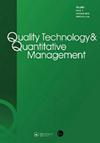具有测量误差的三次抽样X控制图的性能
IF 3
2区 工程技术
Q3 ENGINEERING, INDUSTRIAL
Quality Technology and Quantitative Management
Pub Date : 2022-03-11
DOI:10.1080/16843703.2022.2040702
引用次数: 5
摘要
摘要测量误差的存在会严重改变第二阶段控制图的统计性能。到目前为止,现有文献中还没有关于设计考虑量规测量误差的三重采样控制图的研究报告。在本文中,我们研究了测量误差对基于加性协变量模型的三重采样(TS)控制图检测性能的不利影响。提出了三种基于多重测量的三重采样(MMBTS)方案,以减少测量仪失效对TS图检测性能的不利影响。通过对平均游程长度(ARL)和游程长度标准差(SDRL)的仿真研究表明,测量误差对TS-的游程特性有显著影响。结果还证实,所有提出的补救方法都可以有效地减少不精确测量对TS图性能的不良影响。还进行了灵敏度分析,以评估协变模型参数如何影响TS图的检测性能。最后,利用从弹簧生产系统中获得的实际工业数据,验证了TS图在存在测量误差时的性能。本文章由计算机程序翻译,如有差异,请以英文原文为准。
The Performance of Triple Sampling X Control Chart with Measurement Errors
ABSTRACT The presence of measurement errors can seriously alter the statistical performance of Phase II control charts. Up today, no research on designing the triple sampling control charts taking into account the gauge measurement errors is reported in the existing literature. In this paper, we study the adverse effect of measurement errors on detecting performance of triple sampling (TS)- control chart based on an additive covariate model. Three multiple measurement based triple sampling (MMBTS) schemes are developed to reduce the undesired impact of gauge inability on detecting performance of TS- chart. Through simulation studies in terms of average run length (ARL) and standard deviation of run length (SDRL), it is indicated that the run length characteristics of the TS- is significantly affected by the measurement errors. The results also confirm that all proposed remedial approaches can effectively reduce the undesired impact of imprecise measurements on performance of TS- chart. A sensitivity analysis is also carried out to evaluate how the covariate model parameters affect the detection performance of the TS- chart. Finally, using a real industrial data obtained from the spring production system, we demonstrate the performance of TS- chart when the measurement errors exist.
求助全文
通过发布文献求助,成功后即可免费获取论文全文。
去求助
来源期刊

Quality Technology and Quantitative Management
ENGINEERING, INDUSTRIAL-OPERATIONS RESEARCH & MANAGEMENT SCIENCE
CiteScore
5.10
自引率
21.40%
发文量
47
审稿时长
>12 weeks
期刊介绍:
Quality Technology and Quantitative Management is an international refereed journal publishing original work in quality, reliability, queuing service systems, applied statistics (including methodology, data analysis, simulation), and their applications in business and industrial management. The journal publishes both theoretical and applied research articles using statistical methods or presenting new results, which solve or have the potential to solve real-world management problems.
 求助内容:
求助内容: 应助结果提醒方式:
应助结果提醒方式:


